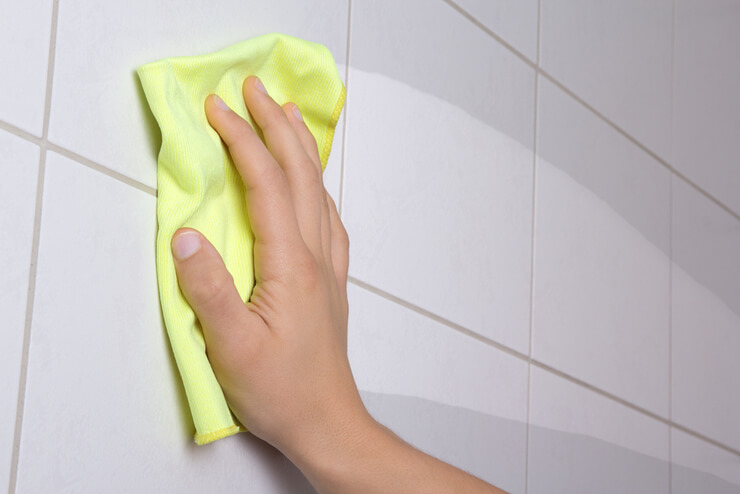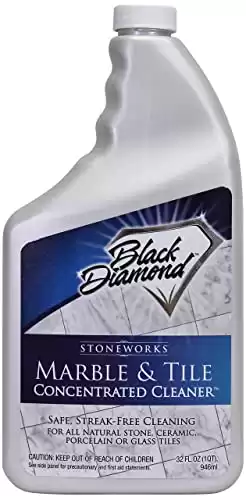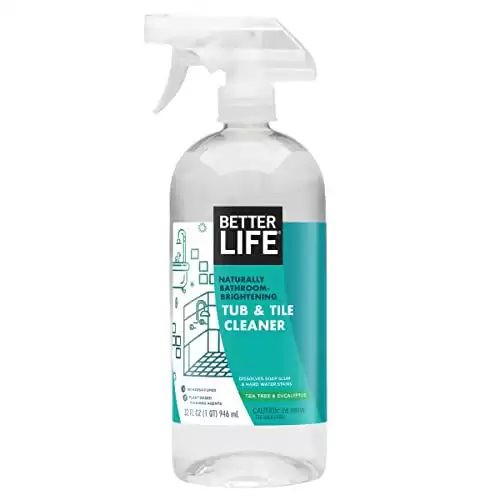When I first noticed the dullness of my porcelain shower tiles, I knew something had to change.
Through trial and error, I mastered how to clean porcelain tile in the shower for both matte and glazed surfaces.
Let me share these simple tricks that turned a dreaded chore into a satisfying routine.

Matte (Unpolished) vs Glazed (Polished) Porcelain Tiles: What Is the Difference?
A matte (unpolished) finish has uniform color and texture.
It does not contain any glaze that can be cleaned or faded off.
It is pretty solid and durable and great for floors and walls.
A glazed (polished) finish is like the designer version.
It is covered in a layer of color and can be done in different styles, textures, and colors.
It can mimic natural stones like limestone and granite, as well as fabrics and animal skin.
Whatever your choice, you can’t keep all that cuteness in your shower without taking proper care of it.
Follow this step-by-step guide on how to clean your shower porcelain tiles.
How to Clean Matte (Unpolished) Porcelain Tiles in the Shower
Matte porcelain tiles are easy to clean.
For everyday cleaning, use warm water and a mop.
For weekly cleaning, you can use a mild detergent mixed with warm water and mop or make a solution using white vinegar and water and spray on the surface, leave it for 10-15 minutes until the dirt loosens, and brush it off.
Use warm water and a clean microfiber cloth to wipe it dry after that.
Unpolished porcelain tiles are often used on shower floors due to their non-slippery qualities.
If you have persistent stains on your porcelain tiles in the shower, check out natural stone cleaners that don’t damage the tile surface.
- Safe for porcelain
- No-rinse hypoallergenic formula
- Can also be used for cleaning natural stone, brick, ceramic, and granite
How to Clean Glazed (Polished) Porcelain Tiles in the Shower
Cleaning glazed porcelain can be more time-consuming than matte porcelain, as it requires special care.
In the beginning, you will need to sweep, vacuum, and then spray hot water to help loosen the stains.
You can scrub it off with a soft nylon bristle brush or an old toothbrush if the stains are tough.
Then, use a warm water mop and a soft sponge to clean off the residue and dry the floor.
Once the floor is completely dry, polish it with a clean cheesecloth for a sparkling shine.
While porcelain is stain-resistant, for stubborn stains, mix equal parts of white vinegar and water and repeat the cleaning process.
If you have an old porcelain tile in your shower or particularly persistent stains, use natural porcelain cleaners free of harsh chemicals and scents.
- Removes soap scum, grime, hard water deposits
- No harsh chemicals or fumes, contains natural plant-powered ingredients
- Great scent
- Easy on the lungs, family and pet safe
Things You Shouldn’t Use on Your Porcelain Tiles
- Never use harsh chemicals, such as bleach or acid-based products, on your porcelain tiles. Even if you need to use ammonia as a suitable cleaning agent, make sure it is very diluted. Otherwise, it might ruin the colors and appearance.
- Don’t use oil-based products, like wax cleaners. These types of cleaners react with the dirt in the tiles to form a tough stain.
- Do not use dye or coloring cleaners to clean your matte tiles. The mixture will not only brighten up matte tiles, but it actually will also add colors that are not as pretty. A mild detergent will do just fine.
- You must never let steel wool touch the tile. It may cause rusty stains on the tiles if it gets stuck, which would ruin the tiles.
- Restrain from using hard bristles or scrub brushes for the porcelain tiles. Hard bristles or scrubs might ruin the shine.
FAQ
Vinegar won’t damage your porcelain tiles as long as it is applied properly. Too much exposure to strong vinegar can strip away the finish, causing tiles to look less attractive and vulnerable to damage.
The extra density of porcelain makes it less prone to chipping compared to ceramic. The level of resistance to scratches and chips on porcelain tiles is determined by the PEI rating.
Porcelain tiles are among the most durable materials for flooring and walls. When maintained properly, porcelain tiles can last for as long as 50 years.



